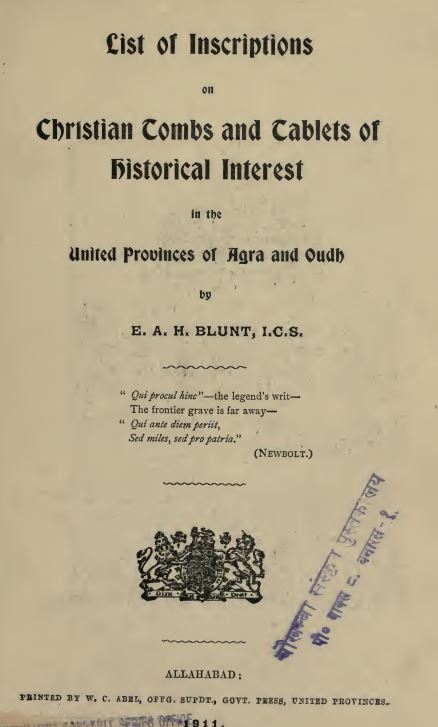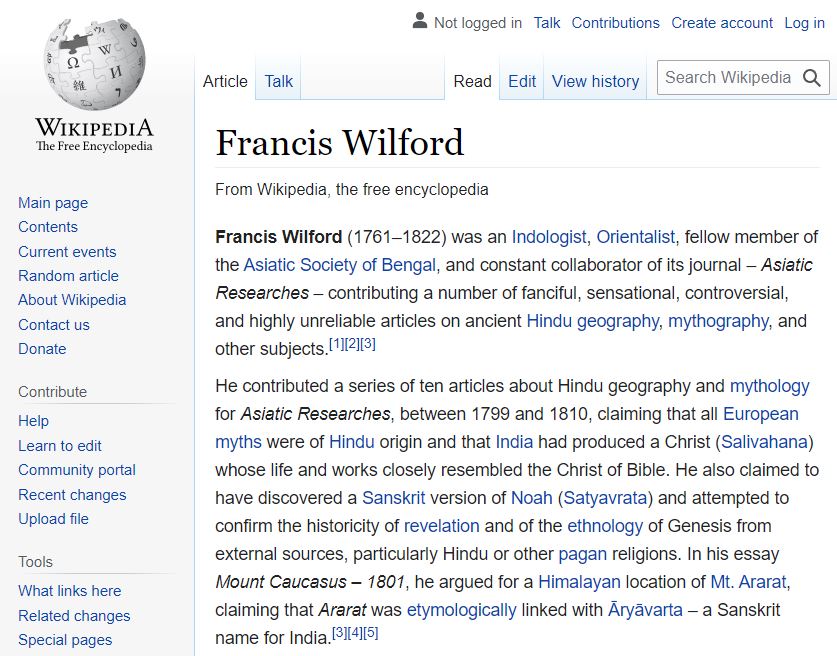1761-1822— WILFORD, F., Lieutenant- Colonel.
Sacred to the memory of Francis Wilford, Lieutenant- Colonel in the Engineer Service of the East India Company, aged 71
years, deceased on the 4th of September 1822.
Wilford tried to find links between the ancient Indian wisdom of the Vedas and Puranas; and the knowledge of the ancient Egyptian, Israelites, and Greeks.
Wilford claimed that the “coming of a saviour from the West is foretold,” based on Sanskrit texts in procured manuscripts (both Puranas and Vedas)
Encouraged by the liberality of the Government of British India, he fixed his residence at Benares in the year 1788 ; and whilst yet, in the vigour of his days, devoted his life to retirement and study, eminently qualified by previous education, extensive erudition, a, true intellect and indefatigable zeal. He made himself master of the classical language and literature of the Hindus, and applied his knowledge to the eradiation of the dark periods of antiquity, with a success that perpetuates his own reputation and the honour of the British name in the East.
In the social relations of life, his merits were proportioned to his talents, and the abilities of the scholar were reflected by the virtues of the man. [Colonel Wilford was an Oriental and Sanskrit scholar of considerable repute, a devoted supporter of the Asiatic Society of Bengal, and a voluminous contributor to the pages of the Asiatick Researches. Many of his dissertations on the chronology, history and antiquities of India show great learning, labour and ingenuity ; but the extravagance of their conjectures at once makes the leader dubious of their real value. The very titles of these articles are almost enough to throw doubt on them ; e.g. one finds essays ” on Egypt and other countries adjacent to the Nile, from the ancient books of the Hindus, on Bemiramis, the origin of Mecca, & from the Hindu Sacred Books ; “on the names of the Gabirian Deities and on some words used in the mysteries of Eleusis; ” “on Mount Caucasus; on the sacred Isles of the West.”
It is not therefore surprising to come across the discovery, stated by Wilford himself in a later essay, that he had been imposed upon by his pandits, who with an oriental’s characteristic desire to say that which would prove acceptable to the hearer, did not hesitate to forge the names of such places as “Egypt” or “Mount Meru” in old manuscripts, by substituting them for the names of their places, and in one case at least even went so far as to write themselves a whole book of several thousand lines to prove something Wilford wanted to prove. Bui in the wild conjectures of which Wilford was guilty he was by no means alone : and it is not perhaps surprising that in an age when the orator still quoted Virgil in the House of Commons or over the wine, classical scholars brought face to face with an ancient literature should allow their fancy to run riot in analogies and comparisons between what they knew and what they were striving to learn. Certainly, Wilford, when he discovered how he had been cheated, published with the most complete candour a recantation of his former opinions ; with the result that his later works (e. g. his essays on the Geography of India) are of great value.
He was well fitted for the direction of Jonathan Duncan’s new Sanskrit, College at Benares. The College had been opened in 1791 : but things did not go well : disputes and abuses occurred : and Government appointed (1798) a committee consisting of Messrs. Cherry and Davis and Captain Wilford to inquire into these. It was in 1799 that Wilford reported and obtained the dismissal of the Pandit who had deceived him, Vidyanand by name, and a professor in the College. In 1800 Captain Wilford became Secretary to the Committee which took over the management of the College ; and for some years he practically ruled the institution. It is not quite clear when he severed his connection with it. Of the man himself, all that is discoverable is that he was of Swiss extraction ; but his name is remembered as that of a scholar. He joined the service in 1781, became lieutenant-colonel in 1814 and was subsequently invalided. Otherwise he appears to have no history. As was said of a greater philosopher, philosophers seldom have any history : ” it is a compensation.”]
(References : . A. S. B. Cent. Rev. Nicholls ; Arch. Sur. Mep.)
From:
Christian Tombs and Monuments, published by Dr. Fiihrerin 1895.

